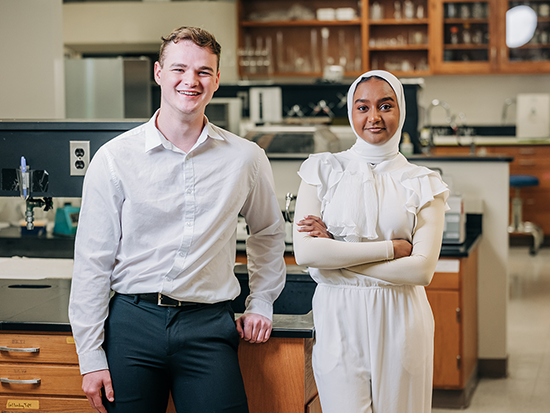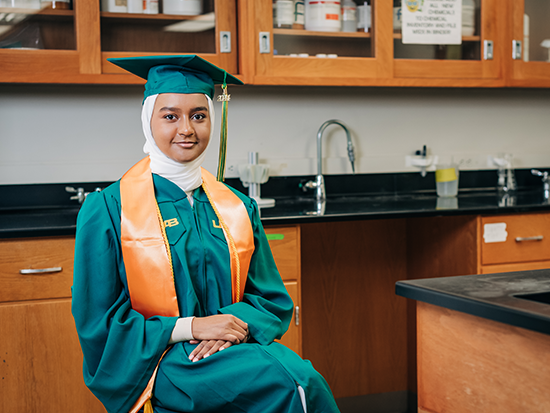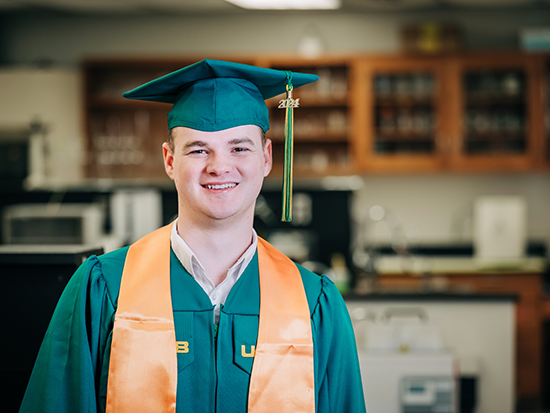 The UAB Center for Community Outreach Development RACE21 program has equipped seniors James Walts and Sarah Elimam with years of lab and youth outreach experience to become well-rounded researchers of the future.The University of Alabama at Birmingham Center for Community Outreach and Development’s Roadmap for America’s Cancer Explorers for the 21st Century, or RACE21, program is actively developing the future of cancer researchers, including graduating seniors James Walts and Sarah Elimam.
The UAB Center for Community Outreach Development RACE21 program has equipped seniors James Walts and Sarah Elimam with years of lab and youth outreach experience to become well-rounded researchers of the future.The University of Alabama at Birmingham Center for Community Outreach and Development’s Roadmap for America’s Cancer Explorers for the 21st Century, or RACE21, program is actively developing the future of cancer researchers, including graduating seniors James Walts and Sarah Elimam.
Under the National Cancer Institute and the O’Neal Comprehensive Cancer Center at UAB, RACE21 offers a unique research experience and instruction opportunity to students interested in mentorship and hands-on teaching opportunities. Walts and Elimam attest that this program is one of many ways UAB provides specialized educational opportunities and overall undergraduate matriculation.
Fostering community through unique programming
“RACE21 has given me the opportunity to flourish in a community of likeminded individuals with similar interests and experiences,” said Walts, a native of Elkmont, Alabama, majoring in biology with a concentration in molecular biology. “The community I’ve been a part of has been the most rewarding aspect of the opportunity because these relationships have not only given me genuine connections but have served as support system throughout my program.”
Walts was accepted into the RACE21 program in the spring of 2022 and has been instrumental as a facilitator for BioBridge summer outreach for rising ninth graders ever since.
As part of the RACE21 program, Walts performs undergraduate research under the direction of Nicole Riddle, Ph.D., professor in the Department of Biology, where he focuses on how altering phosphorylation status — through mimicking or blocking — of heterochromatin protein 1a, or HP1a, impacts said protein’s function at maintaining the genome.
“One of the greatest lessons I’ve learned over these past four years is the importance of collaboration,” Walts said. “To be successful in this field requires some form of teamwork. UAB has taught me both the importance of community and the value of reaching out and asking questions when needed. Having connections is important for community, but it is critical to success to have the option to consult those who have knowledge that you don’t.”
 Elimam stated that she would tell an incoming freshman to always take that step even when they are unsure or afraid. “If there is something you want to do, go for it. Never be your own stopping block. And when you go for it, make sure to utilize the community that comes with it. Having a positive community around you can help you achieve more goals than you could ever realize.” For cancer biology major and Hoover, Alabama, native Elimam, maximizing her opportunities to grow has been an overarching theme in her life.
Elimam stated that she would tell an incoming freshman to always take that step even when they are unsure or afraid. “If there is something you want to do, go for it. Never be your own stopping block. And when you go for it, make sure to utilize the community that comes with it. Having a positive community around you can help you achieve more goals than you could ever realize.” For cancer biology major and Hoover, Alabama, native Elimam, maximizing her opportunities to grow has been an overarching theme in her life.
“My father came to the United States as an international student from Sudan,” Elimam said. “He was seeking better opportunities, and that drive from him has always really inspired me.”
Elimam is in the inaugural class of the cancer biology major and serves as a program ambassador, where she speaks to new students about the major at recruitment-centered events. She is the current president of the Undergraduate Cancer Biology Society and helped revive the organization on the UAB campus after the pandemic. She has served as a supplemental instruction leader for numerous science courses.
“A very close friend I grew up with passed away from cancer in high school,” Elimam said. “There has always been a societal stigma around the way we discuss cancer, and when I found out about this major, I knew it was perfect for my interests in diving more into the science behind it.”
For the past four years, Elimam has conducted undergraduate research in the lab of Carissa Thomas, M.D., Ph.D., in the Department of Otolaryngology. Through the RACE21 program, she has assisted Thomas with her research on the interactions between the microbiome and head and neck squamous cell carcinoma.
RACE21 has allowed Elimam an environment to do funded cancer research and has fostered mentorship and leadership within her.
“When I found out about RACE21, I immediately began working on the application,” Elimam said. “RACE21 has helped me coordinate outreach and create ways to simplify the science behind these complex topics, which I believe are skills that can help me in the future with being a cognizant and tactful physician.”
Hands-on teaching and youth outreach experience
 One piece of advice Walts said he would give to an incoming freshman is to just explore who you are. “Be open-minded, and just go for it. There’s no harm in trying new things. It’s OK if you don’t have all the answers right now, but use this time efficiently to explore the many avenues and opportunities that are available to you.”Every year during the summer, CORD hosts a weeklong course twice that provides experiences covering the principles of cellular and molecular biology and genetics using technology and relative laboratory techniques.
One piece of advice Walts said he would give to an incoming freshman is to just explore who you are. “Be open-minded, and just go for it. There’s no harm in trying new things. It’s OK if you don’t have all the answers right now, but use this time efficiently to explore the many avenues and opportunities that are available to you.”Every year during the summer, CORD hosts a weeklong course twice that provides experiences covering the principles of cellular and molecular biology and genetics using technology and relative laboratory techniques.
BioBridge offers a head start on high school-level biology content in the context of cancer research.
“With BioBridge, we invite local rising ninth graders to come to this camp, and we essentially create fun and innovative ways to teach them cancer-related science,” Walts said.
RACE21 and BioBridge offered Elimam an invaluable sense of community and mentorship while she actively participated in a research lab environment.
“The BioBridge camp has been really good for me creatively in developing interactive ways to teach cancer biology topics and material,” Elimam said. “The personal development through the use of these practical skills has helped equip me for various opportunities in the future.”
Both Elimam and Walts will walk the stage at commencement April 27.
After graduation, Walts will return to UAB to complete his master’s degree in biology and ultimately plans to pursue his Ph.D. Elimam plans to take a gap year to travel and visit family overseas and will enroll in medical school for fall of 2025 pursuing oncology.
Walts is a member of the UAB Honors College on a personalized pathway. A 2023 recipient of the NASA Alabama Space Grant Consortium scholarship, Walts is currently a part of the Fifth Year Biology Master’s Program. He has applied and received four research grants during his time at UAB. Walts has attended two international conferences — The 64th Annual Drosophila Research Conference and The Allied Genetics Conference — and has also attended the National Conference on Undergraduate Research.
Michelle Johnson, Program Manager for RACE21, said James and Sarah have been ideal students for the program. “As you approach this next step in your life, embrace the journey, for you'll find your most authentic self in pursuing your dreams.”
Elimam is a member of the UAB Honors College and has served as an international mentor for the past two years.
RACE21 allows freshman and sophomore students to complete a paid summer internship. Students in their junior or senior year who continue in the program receive fellowships as undergraduate cancer researchers and are enrolled in undergraduate research hours during the fall and spring semesters.
CORD focuses on the advancement of outreach efforts of UAB through science education and research. Since 1998, CORD has sought to develop programs that have increased opportunities for K-12 students of all backgrounds to be exposed to more in-depth levels of science, technology and mathematics. Through the cultivation of UAB undergraduate students, CORD works to equip college students to instruct local youth in these outreach programs.